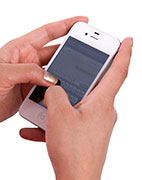Small study contends that people who use the devices more often are likelier to have the disorder
WEDNESDAY, July 15, 2015 (HealthDay News) — Smartphone data may be useful in identification of symptoms of depression, according to research published online July 15 in the Journal of Medical Internet Research.
The small study — involving just 20 women and eight men, averaging 29 years of age — looked at data from the people’s phones to track the number of minutes they used their phone, as well as their locations throughout the day. The researchers from the Northwestern University Feinberg School of Medicine in Chicago tracked two weeks’ of phone use and global positioning system (GPS) data from the 28 participants’ smartphones.
The more time a person spent on their phone, the more likely they were to be depressed, according to the team led by clinical psychologist David Mohr, Ph.D., who directs the university’s Center for Behavioral Intervention Technologies. For example, average daily smartphone use by those with depression was 68 minutes, compared with only 17 minutes by those without depression, his team found. Also, the GPS data showed that people who were depressed tended to spend more time at home, or in fewer locations, compared to people who weren’t depressed. People who had less of a regular day-to-day schedule, or who left home and went to work at different times each day, were also more prone to depression, the researchers contended.
Overall, the smartphone data were 87 percent accurate in spotting people with symptoms of depression, according to the study authors. Mohr said in a university news release that he believes that simply by looking at phone data, “we can detect if a person has depressive symptoms and the severity of those symptoms without asking them any questions.” What’s more, “phones can provide data unobtrusively and with no effort on the part of the user,” he said.
Full Text
Copyright © 2015 HealthDay. All rights reserved.








